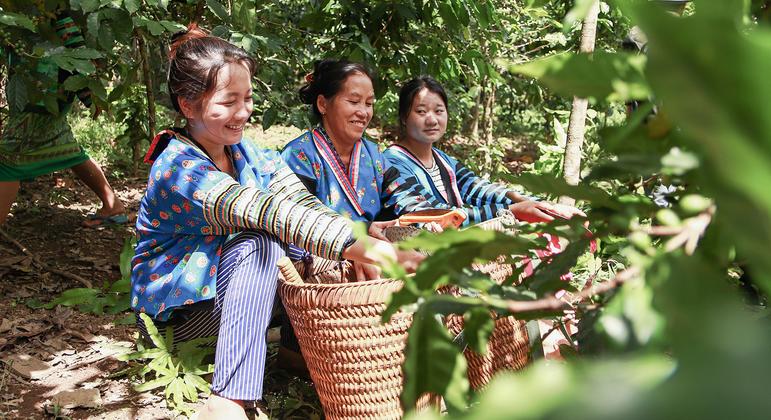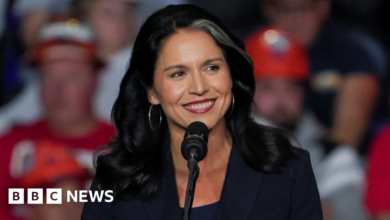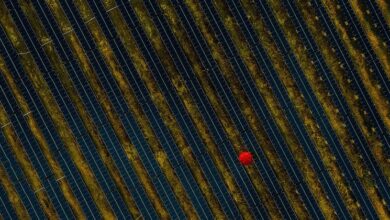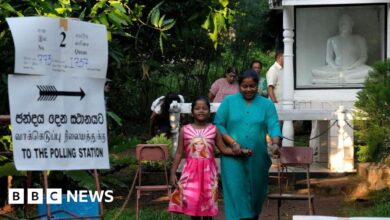Farmers build a opium-free future for Lao PDR

“I wake up at 4 a.m. during harvest season to pick red berries and take them to the processing factory,” Phuperp, 22, told the United Nations.
Phuperp comes from a family of farmers who grow corn, rice, beans and pumpkins, but her favorite crop is coffee.
It can be grown without having to clear trees, which helps prevent deforestation and importantly, at least for Phuperp, it grows best in the shade.
“If possible, I only harvest coffee because it allows me to work in the shade, away from the hot sun,” she said.
Since 2016, the United Nations Office on Drugs and Crime (UNODC), in partnership with the Government of Laos, has worked to promote alternative livelihoods for local farmers in Houaphanh and other provinces particularly affected by the cultivation of poppy, the plant from which opium is made.
The shift to growing coffee changed the Phuerp community. “Opium cultivation traps communities in poverty,” she said. “With coffee, we are building a future.”

A farmer checks coffee plants in a nursery.
More than a drink
Phuerp brought her coffee, which according to its tasting notes was “floral, apple, chocolatey and sweet” to the United Nations Building in Vientiane, the capital of Laos, where she served a cup for the United Nations. Secretary General António Guterres.
“Congratulations,” said António Guterres. Coffee takes a lot of time to grow, right?”

UN Secretary General António Guterres (right) meets Lao coffee farmer Phuerp (left).
Strengthen the rural economy
Phuerp is a member of Van Mai Coffee Cooperative representing 341 farmer households growing 405 hectares of coffee throughout Houaphanh province.
Vanmai members are now starting to build a legal, sustainable future in a region where farmers often grow opium, which can be used to produce heroin and other illegal and legal drugs. other law.
Mr. Guterres praised the cooperative’s success, demonstrating the role coffee plays in strengthening rural economies while addressing global challenges such as poverty and drug trafficking.
new day
“Vanmai, which means ‘new day’ in Lao, encapsulates the hope and resilience of these communities,” said Soutthida Soukthavone, alternative development specialist at UNODC.
The cooperative’s efforts not only bring sustainable livelihoods to local farmers but also open doors to international markets.
With more than 230 tons of green coffee beans exported, the cooperative has secured a long-term trading partnership, achieved Fairtrade certification and is transitioning to organic production.
Women lead the way
Vanmai Women’s Network was established in 2021 to increase women’s participation in the coffee business. The network manages initiatives such as the Vanmai Coffee Cart at UN House in Vientiane, where the Secretary-General and Phuerp shared their coffee moment.
The carts are managed by the cooperative’s women, demonstrating their increasing role in decision-making, a change from previous practices in which women were less involved in leadership roles.

Coffee growing can support reforestation.
Here, the bean to cup philosophy comes to life, as coffee is sold directly to customers, generating income that goes back to the farming community.
“Van Mai Coffee Cooperative is not just a business; it is a testament to the power of alternative development,” said Sung Ho Hwang, UNODC Chief of Office in Laos.
“This coffee tells a story, a story of resilience, of cooperation and hope. It shows us that, with the right support, communities can participate in the legal market and create a better future for themselves and their children,” he added.
“By providing farmers with a legal, profitable crop, it addresses the root causes of opium cultivation, poverty, isolation and lack of opportunity.”
UNODC alternative development initiatives aim to promote legitimate economic dynamism and inclusive socio-economic development in rural areas in Laos and Myanmar, as well as Afghanistan, Bolivia, Colombia and Peru .
Mr. Guterres finished his cup of coffee with Phuerp, who was still clutching the cup with his sun-dried peasant hands, smiling quietly.




